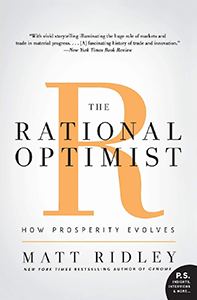The Rational Optimist
“The Rational Optimist: How Prosperity Evolves” is a book written by Matt Ridley, a British science writer and author. Here’s a summary of the key themes and concepts from the book:
Optimism and Progress: Ridley argues that human history has been marked by continuous progress and improvement in living standards, despite occasional setbacks and challenges. He challenges pessimistic views and asserts that technological innovation and human ingenuity have consistently led to improvements in quality of life.
Exchange and Specialization: A central theme of the book is the importance of exchange and specialization in fostering economic growth and prosperity. Ridley explores how trade and the division of labor enable individuals and societies to leverage comparative advantages, leading to increased productivity and innovation.
Technological Innovation: Ridley emphasizes the role of technological innovation as a driver of prosperity. He discusses how inventions and innovations throughout history—from agriculture to industrialization to digital technology—have contributed to economic growth, expanded opportunities, and improved standards of living.
The Power of Ideas: The book highlights the power of ideas, arguing that progress is fueled by the exchange and combination of ideas across cultures and generations. Ridley explores how ideas spread, evolve, and lead to new discoveries and advancements.
Challenges and Adaptation: While acknowledging challenges such as environmental concerns and resource scarcity, Ridley maintains an optimistic outlook, suggesting that human adaptability and technological progress will continue to mitigate these challenges over time.
Critique of Doom-and-Gloom Narratives: Ridley critiques pessimistic narratives that focus solely on problems and catastrophes, arguing that such views often ignore the resilience of human societies and underestimate the capacity for innovation and adaptation.
Evolutionary Perspective: Drawing on evolutionary biology and economics, Ridley offers a perspective on how human societies evolve and improve over generations. He discusses the parallels between biological evolution and cultural evolution, emphasizing the role of competition and cooperation in driving progress.
Overall, “The Rational Optimist” presents a compelling argument for why optimism about the future of humanity is justified based on historical trends and patterns of innovation and prosperity. It encourages readers to adopt a rational and hopeful outlook grounded in evidence of human progress and resilience.

